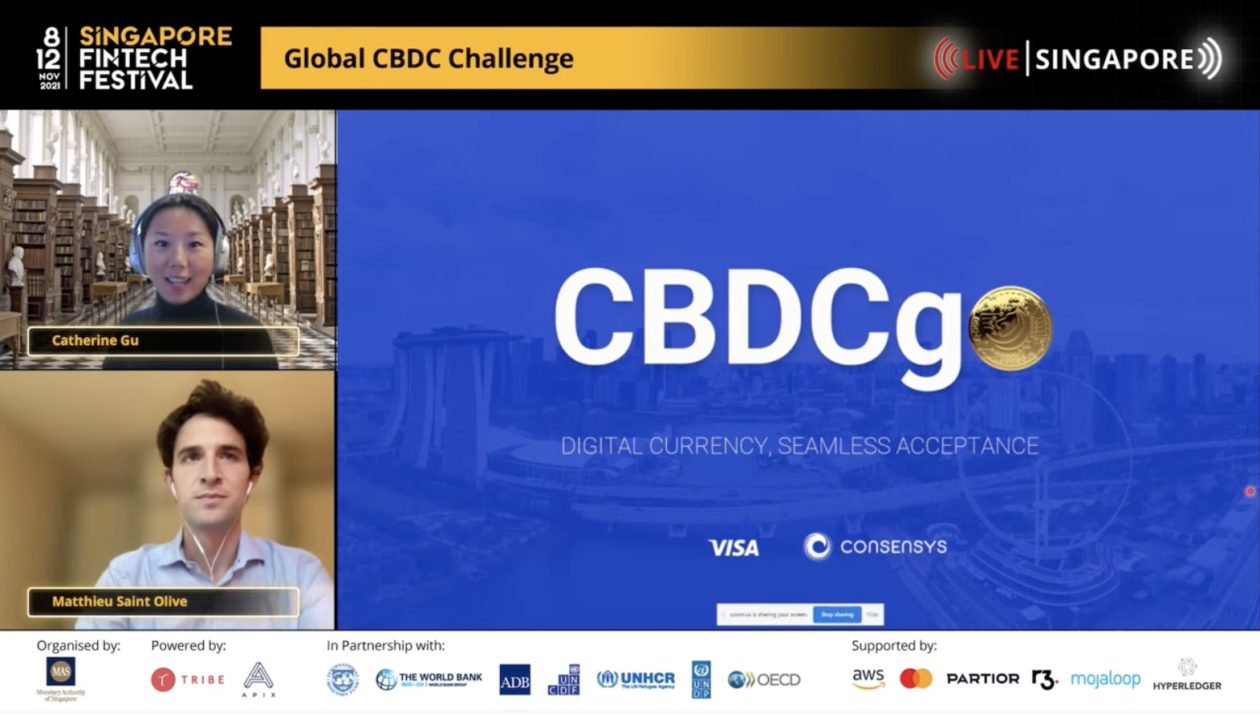After five months of intense competition with over 300 submissions from more than 50 countries, the Monetary Authority of Singapore (MAS) has announced that three teams — led by by ConsenSys, Criteo SA and Giesecke+Devrient advance52 GmbH — are the winners.
The Global CBDC Challenge, launched in June, called for proposals on “solutions” for a retail CBDC — central bank digital currency for everyday use by the general public — to improve payment services and promote financial inclusion.
The competition was organized by MAS and in partnership with the International Monetary Fund, World Bank, Asian Development Bank, United Nations Capital Development Fund, United Nations High Commission for Refugees, United Nations Development Programme and the Organisation for Economic Co-operation and Development. The winners were selected from 15 finalists who pitched their solutions to an international panel of judges at a demo day during the recent Singapore FinTech Festival.
Ethereum blockchain software company ConsenSys — which is also involved in a growing number of CBDC projects around the world, including in Hong Kong, Thailand, Australia, France and South Africa — partnered with payments giant Visa to develop a proof of concept called CBDCgo — which would integrate with existing systems and allow central banks and financial intermediaries to manage CBDCs through a streamlined application programming interface gateway. Users would be able to spend their digital currency without needing to change their payment or acceptance network.
CBDCgo also involves a multi-touchpoint web user interface, a CBDC mobile software development kit and a physical card for users. Visa’s CBDC retail payment module, which connects to Visa’s network of over 80 million merchants globally, would enable wallet and fund management, CBDC card issuance, spend controls and CBDC payment processing using existing infrastructure. The CBDC blockchain infrastructure, built on ConsenSys Quorum, would enable central banks to issue and distribute CBDC on a permissioned Ethereum network through banks at scale.
The ConsenSys and Visa team told Forkast.News that CBDCgo was designed to address — in consideration of insights they collected from over two dozen central banks around the world — four key priorities common to all CBDCs: interoperability with existing systems, security, accessibility and trust.
Key to the success of a retail CBDC will be a seamless user experience, which would include interoperability on the back end with multiple networks, accessibility and integration with existing payment and financial services, the ConsenSys and Visa team said. Security and trust as well as open standards and open-source infrastructure, which would facilitate future innovations, were also important.
The other two winners took different approaches for their proofs-of-concept. Atomic CBDC by Criteo, Secretarium and Intel is a digital currency platform that is safeguarded by hardware-based security. Atomic CBDC provides anonymity and privacy for small transactions and traceability for large transactions for anti-money laundering and countering the financing of terrorism compliance, according to MAS. G+D Filia by Giesecke+Devrient advance52 GmbH provided a more inclusive solution that did not require a smartphone or a bank account.
See related article: What lies ahead for CBDCs, Bitcoin and other digital currencies?
CBDC initiatives are proliferating around the world. A recent Bank for International Settlements survey found that six out of 10 central banks are experimenting with retail CBDCs. However, most countries have no plans to issue a CBDC any time soon. To date, retail CBDCs that have been launched include the Sand Dollar in The Bahamas, DCash in the Eastern Caribbean and the eNaira in Nigeria.
China is the biggest world economy that is close to launching a major retail CBDC. In development for the last seven years, China’s digital yuan — now officially called the c-CNY — is now in a soft rollout across the country, in use in billions of transactions from online shopping to bicycle rentals, and widely expected to formally launch during the Beijing Winter Olympics in February. Hong Kong, too, is exploring a digital Hong Kong dollar, the e-HKD, via Project Aurum.
Singapore’s Global CBDC Challenge marks the conclusion of the first phase of MAS’ study to explore a retail CBDC. MAS has also announced that it was partnering with the private sector on a retail CBDC project called Project Orchid. The new CBDC initiative aims to build the technology infrastructure and technical competencies needed to issue a digital Singapore dollar should Singapore decide to do so in future.
“The case for a retail CBDC in Singapore is not urgent… The issuance of a retail CBDC is ultimately a socio-economic rather than a monetary consideration,” said Ravi Menon, MAS managing director at the recent Singapore FinTech Festival. “At the same time, MAS recognizes there could be potential benefits offered by innovative retail CBDC solutions in the future.”
See related article: How Singapore is looking at Web 3.0 and DeFi as it prepares for a digital Singapore dollar





